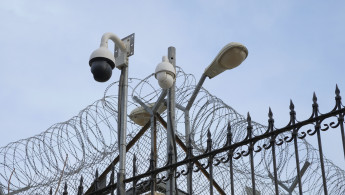Palestinian prisoner's administrative detention cruelly renewed by Israel on release date
A Palestinian detainee had his administrative detention renewed by Israel in defiance of a military court ruling that he should be freed, a prisoners' advocacy group said.
The Palestinian Prisoners' Club said 22-year-old Musllam Ghawanmeh's administrative detention was renewed on the same day he was due to be freed, official Palestinian news agency Wafa reported.
An Israeli military court had said the detention order against Ghawanmeh should not be renewed again.
Israel detained Ghawanmeh, of Jalazone refugee camp in the occupied West Bank, over two years ago.
He received a seven-month jail term, after which he has been imprisoned under successive administrative detention orders.
Palestinians are subject to Israeli military courts in the West Bank in a highly controversial legal system that virtually always sees defendants convicted.
Despite living in the same geographical areas - and doing so in breach of international law - Israeli settlers are tried in civil courts while Palestinians effectively live under military law.
Administrative detention orders typically last for terms of three to six months, which can be renewed indefinitely.
Among the cases documented were 620 children, 111 women and 1,610 Palestinians held in administrative detention, according to the Palestinian Prisoners' Club 👇https://t.co/ug7HJ3QTqM
— The New Arab (@The_NewArab) October 19, 2022
Their use has been criticised by rights groups.
"In violation of the restrictions placed by international law, Israel makes routine, extensive use of administrative detention," leading Israeli human rights organisation B'Tselem said in April.
Amnesty International said administrative detention "may be lawful in certain circumstances" in a February report that found Israel was engaged in a system of apartheid against Palestinians but added that they more often used to punish Palestinians.
"Israel's systematic use of it against Palestinians indicates that it is used to persecute Palestinians, rather than as an extraordinary and selective security measure," it said.





 Follow the Middle East's top stories in English at The New Arab on Google News
Follow the Middle East's top stories in English at The New Arab on Google News

![MP Essam Diab's pursuit to block TikTok in Egypt has revived an already ongoing debate in the country. [Getty]](/sites/default/files/styles/image_330x185/public/1230748046.jpeg?h=a5f2f23a&itok=-8MqBLLC)
